Sainsbury's Operations Management: Review, Critique, and Plan
VerifiedAdded on 2023/06/04
|24
|5210
|63
Report
AI Summary
This report provides a detailed review and critique of operations management within Sainsbury's, a multinational retailing brand. It begins with an introduction to Sainsbury's, outlining its aims and objectives, followed by a comparison of operations and operations management. The report reviews the implementation of operations management principles within the organization, including accountability, reality, quality control, and consumer collaboration. It analyzes the extent to which Sainsbury's operations management meets the organization's requirements, focusing on cost reduction and productivity improvement. The report also discusses continuous improvement as a philosophy, describes Lean principles such as value stream mapping and Kaizen, and proposes a continuous improvement plan with justified recommendations. The report concludes by highlighting the importance of Kaizen for continuous improvements within Sainsbury's, aiming to benefit the organization and align employees with set targets.
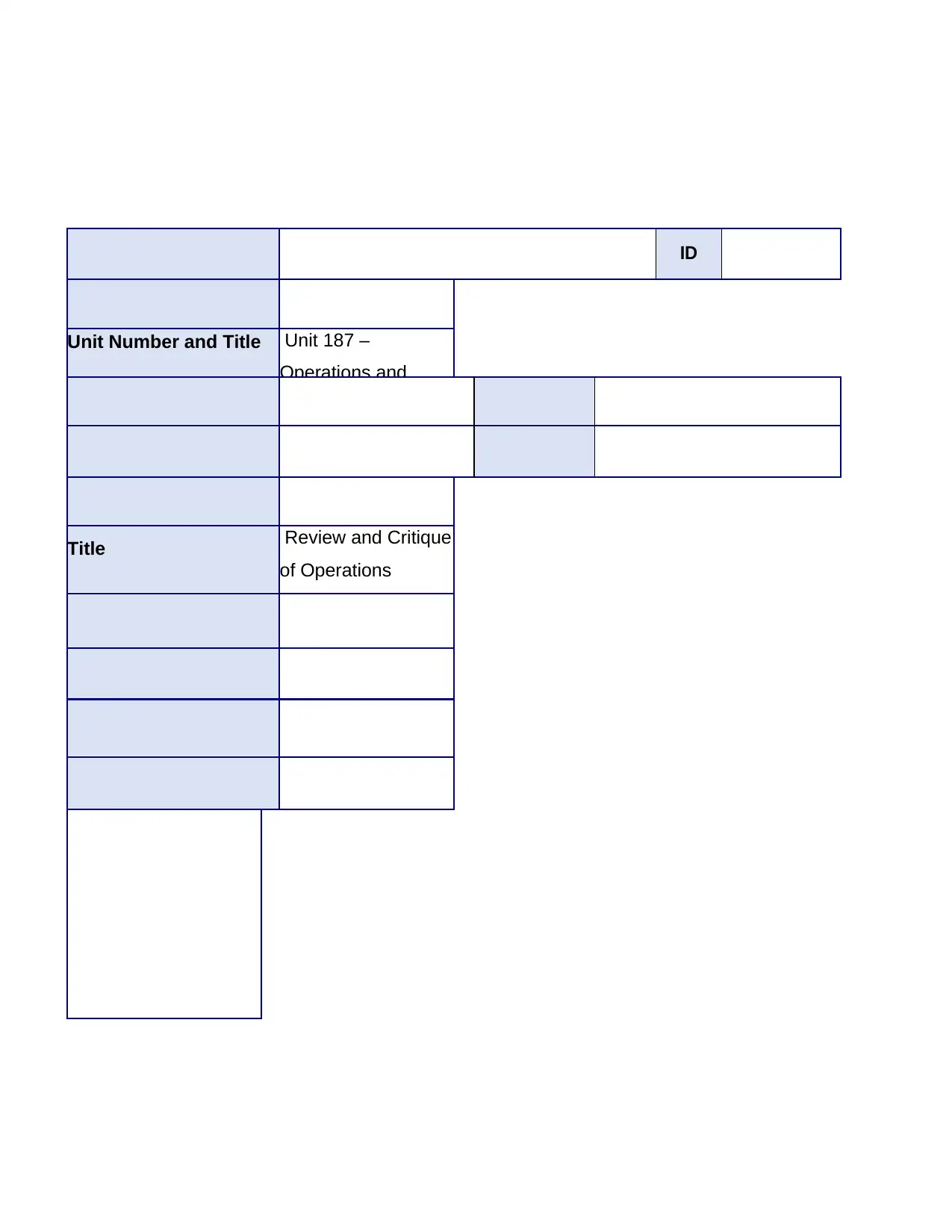
ID
Unit Number and Title Unit 187 –
Operations and
Title Review and Critique
of Operations
Management (Part
Unit Number and Title Unit 187 –
Operations and
Title Review and Critique
of Operations
Management (Part
Paraphrase This Document
Need a fresh take? Get an instant paraphrase of this document with our AI Paraphraser
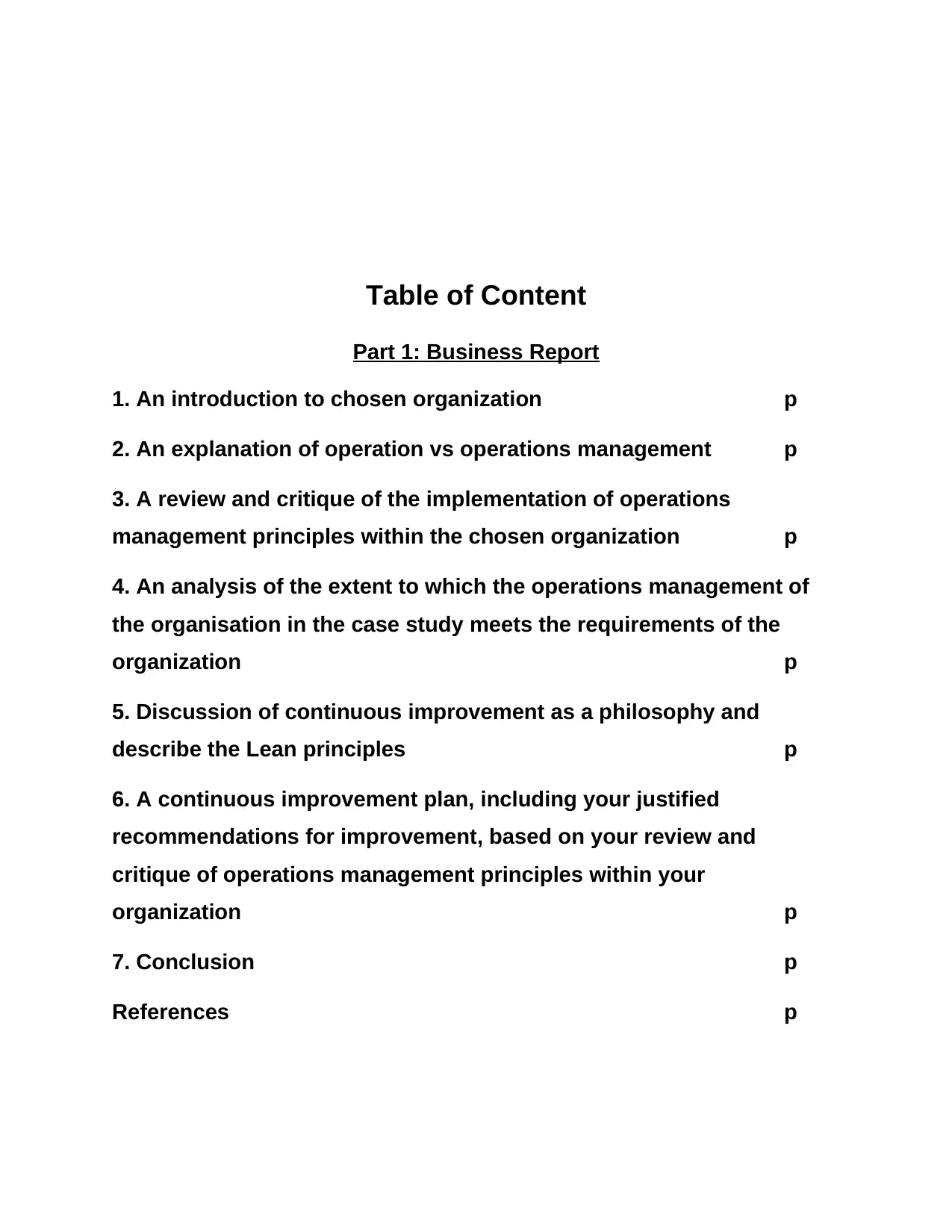
Table of Content
Part 1: Business Report
1. An introduction to chosen organization p
2. An explanation of operation vs operations management p
3. A review and critique of the implementation of operations
management principles within the chosen organization p
4. An analysis of the extent to which the operations management of
the organisation in the case study meets the requirements of the
organization p
5. Discussion of continuous improvement as a philosophy and
describe the Lean principles p
6. A continuous improvement plan, including your justified
recommendations for improvement, based on your review and
critique of operations management principles within your
organization p
7. Conclusion p
References p
Part 1: Business Report
1. An introduction to chosen organization p
2. An explanation of operation vs operations management p
3. A review and critique of the implementation of operations
management principles within the chosen organization p
4. An analysis of the extent to which the operations management of
the organisation in the case study meets the requirements of the
organization p
5. Discussion of continuous improvement as a philosophy and
describe the Lean principles p
6. A continuous improvement plan, including your justified
recommendations for improvement, based on your review and
critique of operations management principles within your
organization p
7. Conclusion p
References p
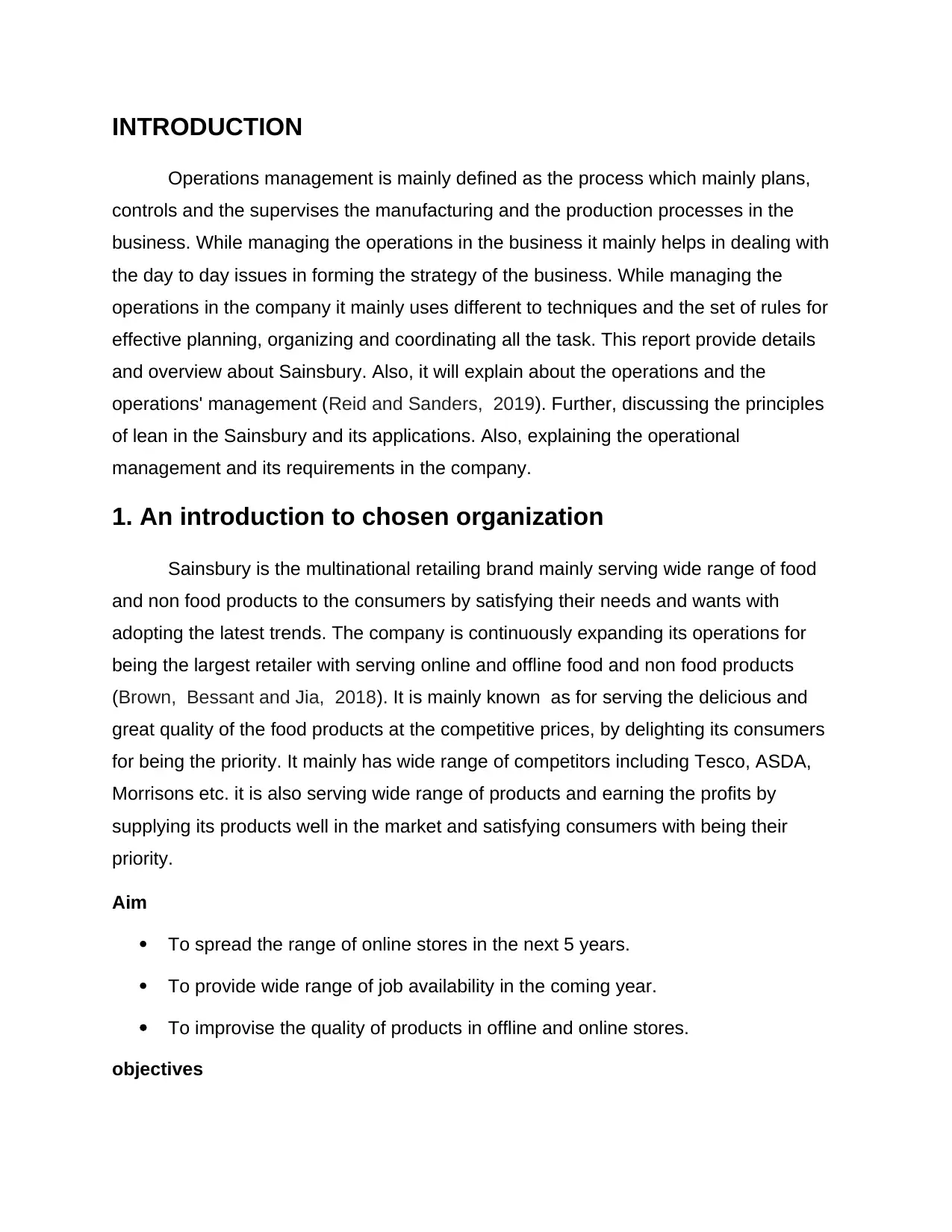
INTRODUCTION
Operations management is mainly defined as the process which mainly plans,
controls and the supervises the manufacturing and the production processes in the
business. While managing the operations in the business it mainly helps in dealing with
the day to day issues in forming the strategy of the business. While managing the
operations in the company it mainly uses different to techniques and the set of rules for
effective planning, organizing and coordinating all the task. This report provide details
and overview about Sainsbury. Also, it will explain about the operations and the
operations' management (Reid and Sanders, 2019). Further, discussing the principles
of lean in the Sainsbury and its applications. Also, explaining the operational
management and its requirements in the company.
1. An introduction to chosen organization
Sainsbury is the multinational retailing brand mainly serving wide range of food
and non food products to the consumers by satisfying their needs and wants with
adopting the latest trends. The company is continuously expanding its operations for
being the largest retailer with serving online and offline food and non food products
(Brown, Bessant and Jia, 2018). It is mainly known as for serving the delicious and
great quality of the food products at the competitive prices, by delighting its consumers
for being the priority. It mainly has wide range of competitors including Tesco, ASDA,
Morrisons etc. it is also serving wide range of products and earning the profits by
supplying its products well in the market and satisfying consumers with being their
priority.
Aim
To spread the range of online stores in the next 5 years.
To provide wide range of job availability in the coming year.
To improvise the quality of products in offline and online stores.
objectives
Operations management is mainly defined as the process which mainly plans,
controls and the supervises the manufacturing and the production processes in the
business. While managing the operations in the business it mainly helps in dealing with
the day to day issues in forming the strategy of the business. While managing the
operations in the company it mainly uses different to techniques and the set of rules for
effective planning, organizing and coordinating all the task. This report provide details
and overview about Sainsbury. Also, it will explain about the operations and the
operations' management (Reid and Sanders, 2019). Further, discussing the principles
of lean in the Sainsbury and its applications. Also, explaining the operational
management and its requirements in the company.
1. An introduction to chosen organization
Sainsbury is the multinational retailing brand mainly serving wide range of food
and non food products to the consumers by satisfying their needs and wants with
adopting the latest trends. The company is continuously expanding its operations for
being the largest retailer with serving online and offline food and non food products
(Brown, Bessant and Jia, 2018). It is mainly known as for serving the delicious and
great quality of the food products at the competitive prices, by delighting its consumers
for being the priority. It mainly has wide range of competitors including Tesco, ASDA,
Morrisons etc. it is also serving wide range of products and earning the profits by
supplying its products well in the market and satisfying consumers with being their
priority.
Aim
To spread the range of online stores in the next 5 years.
To provide wide range of job availability in the coming year.
To improvise the quality of products in offline and online stores.
objectives
⊘ This is a preview!⊘
Do you want full access?
Subscribe today to unlock all pages.

Trusted by 1+ million students worldwide
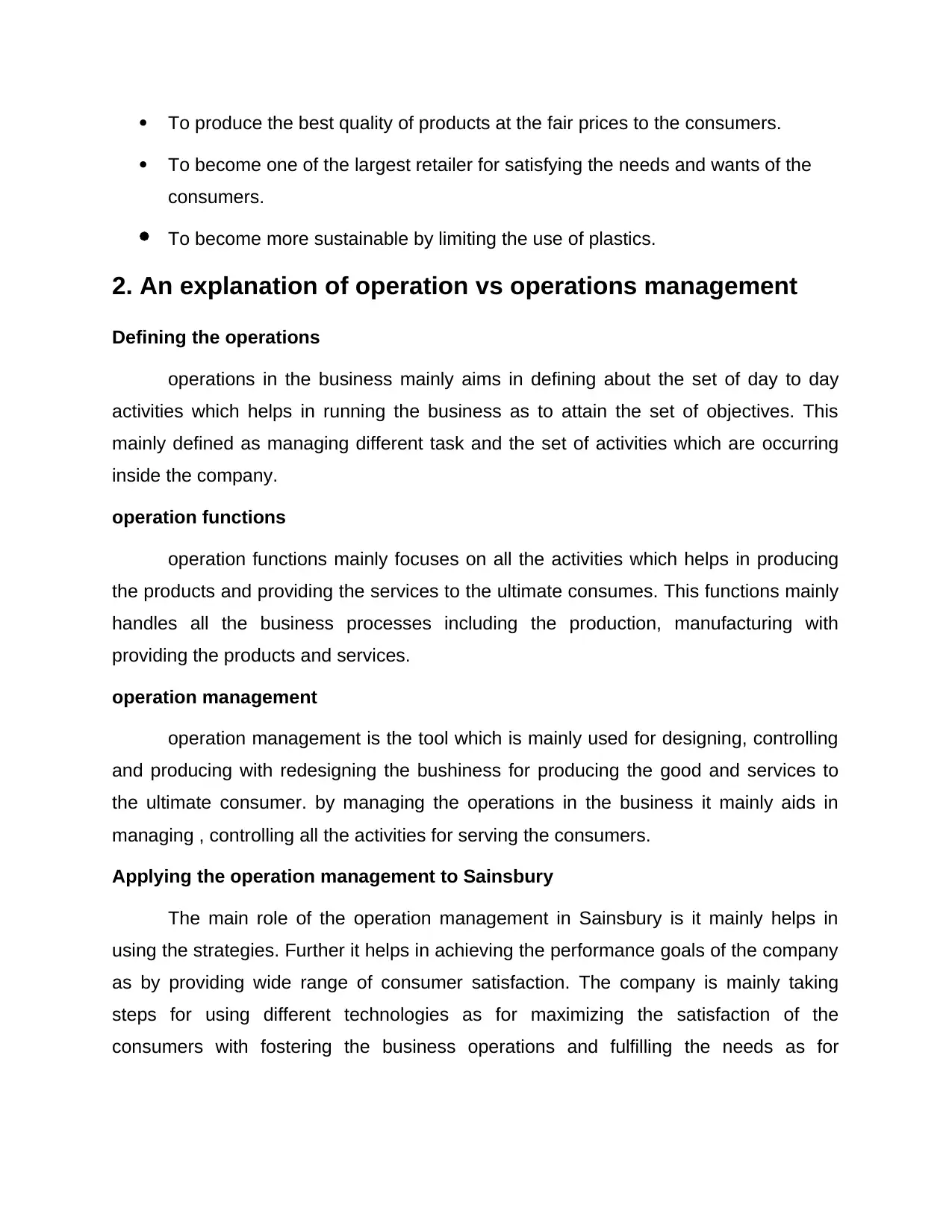
To produce the best quality of products at the fair prices to the consumers.
To become one of the largest retailer for satisfying the needs and wants of the
consumers.
To become more sustainable by limiting the use of plastics.
2. An explanation of operation vs operations management
Defining the operations
operations in the business mainly aims in defining about the set of day to day
activities which helps in running the business as to attain the set of objectives. This
mainly defined as managing different task and the set of activities which are occurring
inside the company.
operation functions
operation functions mainly focuses on all the activities which helps in producing
the products and providing the services to the ultimate consumes. This functions mainly
handles all the business processes including the production, manufacturing with
providing the products and services.
operation management
operation management is the tool which is mainly used for designing, controlling
and producing with redesigning the bushiness for producing the good and services to
the ultimate consumer. by managing the operations in the business it mainly aids in
managing , controlling all the activities for serving the consumers.
Applying the operation management to Sainsbury
The main role of the operation management in Sainsbury is it mainly helps in
using the strategies. Further it helps in achieving the performance goals of the company
as by providing wide range of consumer satisfaction. The company is mainly taking
steps for using different technologies as for maximizing the satisfaction of the
consumers with fostering the business operations and fulfilling the needs as for
To become one of the largest retailer for satisfying the needs and wants of the
consumers.
To become more sustainable by limiting the use of plastics.
2. An explanation of operation vs operations management
Defining the operations
operations in the business mainly aims in defining about the set of day to day
activities which helps in running the business as to attain the set of objectives. This
mainly defined as managing different task and the set of activities which are occurring
inside the company.
operation functions
operation functions mainly focuses on all the activities which helps in producing
the products and providing the services to the ultimate consumes. This functions mainly
handles all the business processes including the production, manufacturing with
providing the products and services.
operation management
operation management is the tool which is mainly used for designing, controlling
and producing with redesigning the bushiness for producing the good and services to
the ultimate consumer. by managing the operations in the business it mainly aids in
managing , controlling all the activities for serving the consumers.
Applying the operation management to Sainsbury
The main role of the operation management in Sainsbury is it mainly helps in
using the strategies. Further it helps in achieving the performance goals of the company
as by providing wide range of consumer satisfaction. The company is mainly taking
steps for using different technologies as for maximizing the satisfaction of the
consumers with fostering the business operations and fulfilling the needs as for
Paraphrase This Document
Need a fresh take? Get an instant paraphrase of this document with our AI Paraphraser
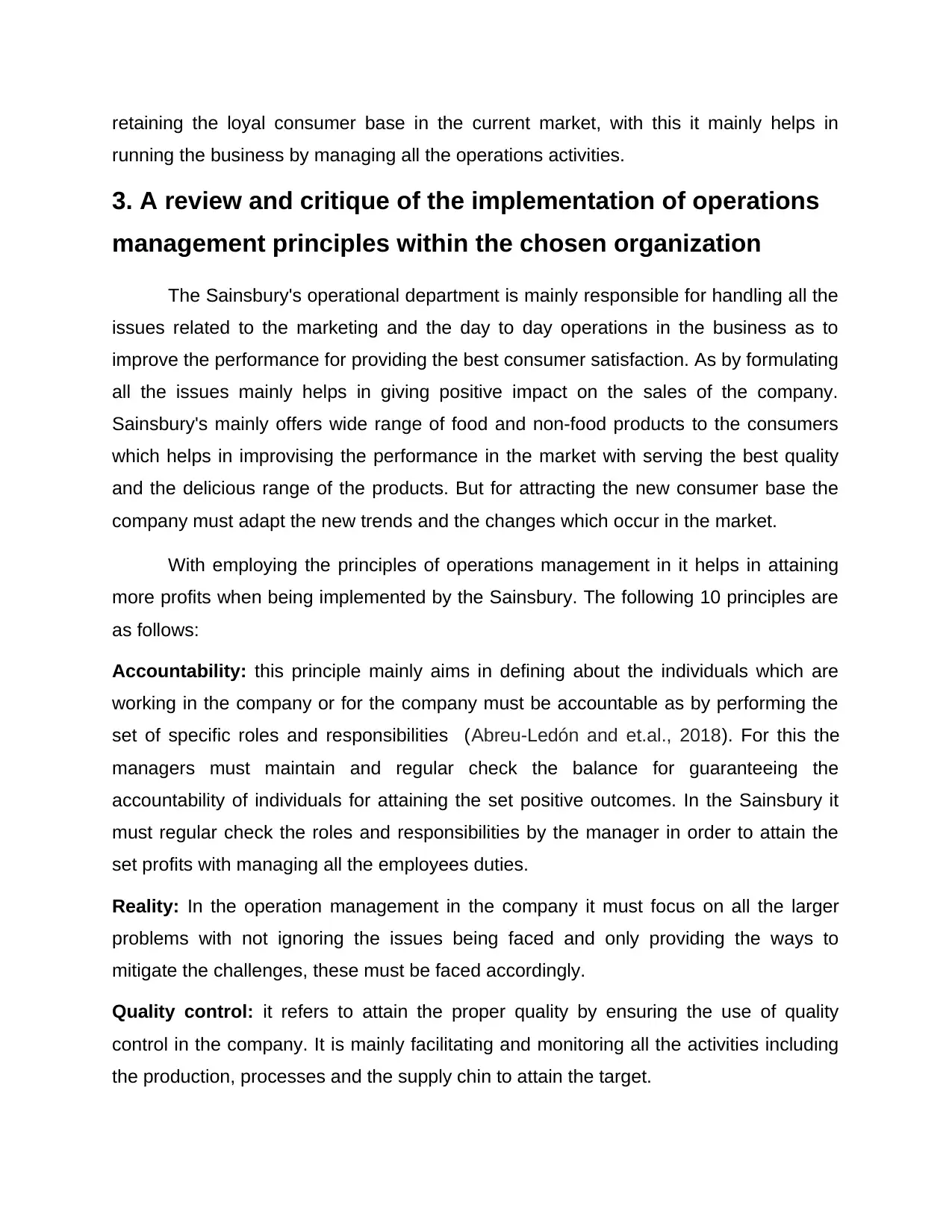
retaining the loyal consumer base in the current market, with this it mainly helps in
running the business by managing all the operations activities.
3. A review and critique of the implementation of operations
management principles within the chosen organization
The Sainsbury's operational department is mainly responsible for handling all the
issues related to the marketing and the day to day operations in the business as to
improve the performance for providing the best consumer satisfaction. As by formulating
all the issues mainly helps in giving positive impact on the sales of the company.
Sainsbury's mainly offers wide range of food and non-food products to the consumers
which helps in improvising the performance in the market with serving the best quality
and the delicious range of the products. But for attracting the new consumer base the
company must adapt the new trends and the changes which occur in the market.
With employing the principles of operations management in it helps in attaining
more profits when being implemented by the Sainsbury. The following 10 principles are
as follows:
Accountability: this principle mainly aims in defining about the individuals which are
working in the company or for the company must be accountable as by performing the
set of specific roles and responsibilities (Abreu-Ledón and et.al., 2018). For this the
managers must maintain and regular check the balance for guaranteeing the
accountability of individuals for attaining the set positive outcomes. In the Sainsbury it
must regular check the roles and responsibilities by the manager in order to attain the
set profits with managing all the employees duties.
Reality: In the operation management in the company it must focus on all the larger
problems with not ignoring the issues being faced and only providing the ways to
mitigate the challenges, these must be faced accordingly.
Quality control: it refers to attain the proper quality by ensuring the use of quality
control in the company. It is mainly facilitating and monitoring all the activities including
the production, processes and the supply chin to attain the target.
running the business by managing all the operations activities.
3. A review and critique of the implementation of operations
management principles within the chosen organization
The Sainsbury's operational department is mainly responsible for handling all the
issues related to the marketing and the day to day operations in the business as to
improve the performance for providing the best consumer satisfaction. As by formulating
all the issues mainly helps in giving positive impact on the sales of the company.
Sainsbury's mainly offers wide range of food and non-food products to the consumers
which helps in improvising the performance in the market with serving the best quality
and the delicious range of the products. But for attracting the new consumer base the
company must adapt the new trends and the changes which occur in the market.
With employing the principles of operations management in it helps in attaining
more profits when being implemented by the Sainsbury. The following 10 principles are
as follows:
Accountability: this principle mainly aims in defining about the individuals which are
working in the company or for the company must be accountable as by performing the
set of specific roles and responsibilities (Abreu-Ledón and et.al., 2018). For this the
managers must maintain and regular check the balance for guaranteeing the
accountability of individuals for attaining the set positive outcomes. In the Sainsbury it
must regular check the roles and responsibilities by the manager in order to attain the
set profits with managing all the employees duties.
Reality: In the operation management in the company it must focus on all the larger
problems with not ignoring the issues being faced and only providing the ways to
mitigate the challenges, these must be faced accordingly.
Quality control: it refers to attain the proper quality by ensuring the use of quality
control in the company. It is mainly facilitating and monitoring all the activities including
the production, processes and the supply chin to attain the target.
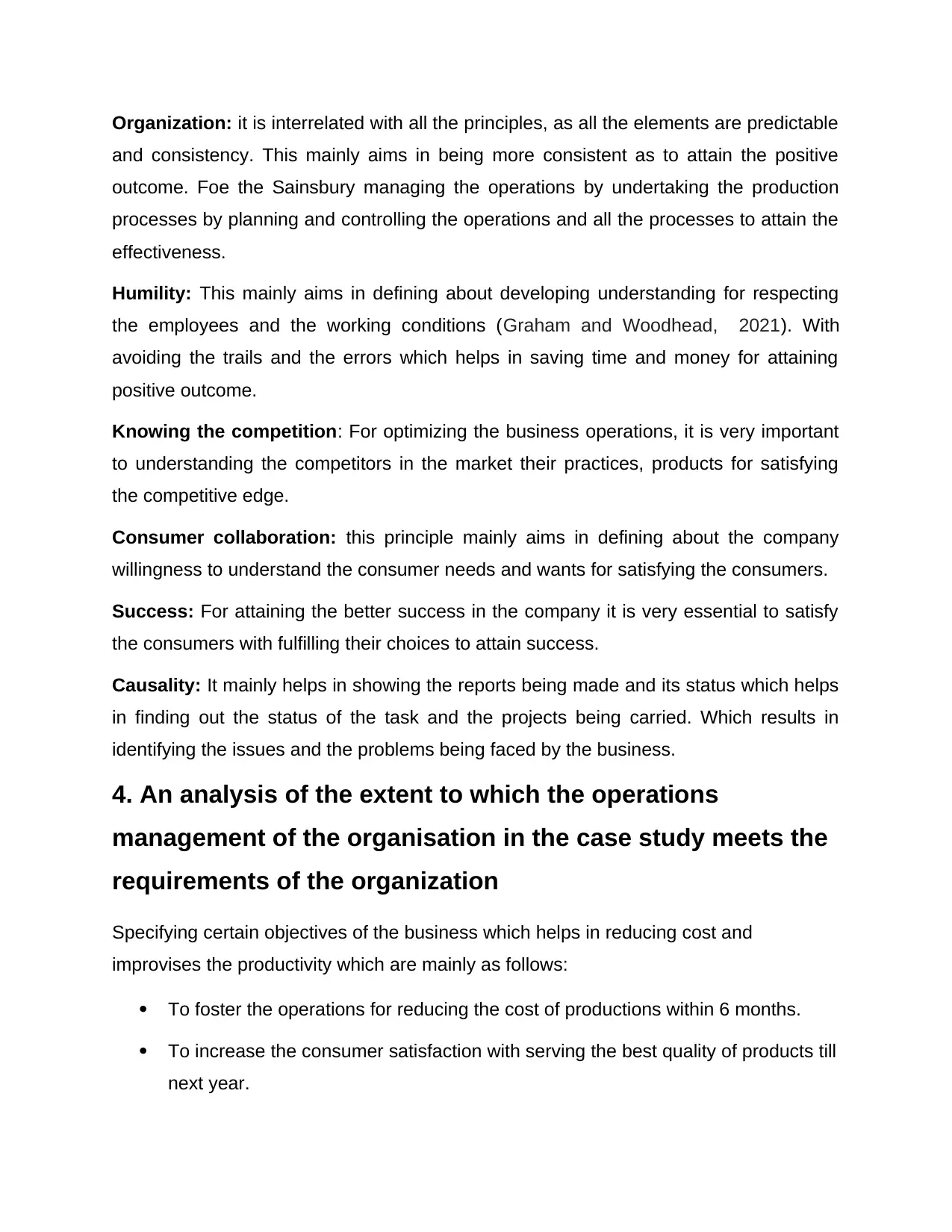
Organization: it is interrelated with all the principles, as all the elements are predictable
and consistency. This mainly aims in being more consistent as to attain the positive
outcome. Foe the Sainsbury managing the operations by undertaking the production
processes by planning and controlling the operations and all the processes to attain the
effectiveness.
Humility: This mainly aims in defining about developing understanding for respecting
the employees and the working conditions (Graham and Woodhead, 2021). With
avoiding the trails and the errors which helps in saving time and money for attaining
positive outcome.
Knowing the competition: For optimizing the business operations, it is very important
to understanding the competitors in the market their practices, products for satisfying
the competitive edge.
Consumer collaboration: this principle mainly aims in defining about the company
willingness to understand the consumer needs and wants for satisfying the consumers.
Success: For attaining the better success in the company it is very essential to satisfy
the consumers with fulfilling their choices to attain success.
Causality: It mainly helps in showing the reports being made and its status which helps
in finding out the status of the task and the projects being carried. Which results in
identifying the issues and the problems being faced by the business.
4. An analysis of the extent to which the operations
management of the organisation in the case study meets the
requirements of the organization
Specifying certain objectives of the business which helps in reducing cost and
improvises the productivity which are mainly as follows:
To foster the operations for reducing the cost of productions within 6 months.
To increase the consumer satisfaction with serving the best quality of products till
next year.
and consistency. This mainly aims in being more consistent as to attain the positive
outcome. Foe the Sainsbury managing the operations by undertaking the production
processes by planning and controlling the operations and all the processes to attain the
effectiveness.
Humility: This mainly aims in defining about developing understanding for respecting
the employees and the working conditions (Graham and Woodhead, 2021). With
avoiding the trails and the errors which helps in saving time and money for attaining
positive outcome.
Knowing the competition: For optimizing the business operations, it is very important
to understanding the competitors in the market their practices, products for satisfying
the competitive edge.
Consumer collaboration: this principle mainly aims in defining about the company
willingness to understand the consumer needs and wants for satisfying the consumers.
Success: For attaining the better success in the company it is very essential to satisfy
the consumers with fulfilling their choices to attain success.
Causality: It mainly helps in showing the reports being made and its status which helps
in finding out the status of the task and the projects being carried. Which results in
identifying the issues and the problems being faced by the business.
4. An analysis of the extent to which the operations
management of the organisation in the case study meets the
requirements of the organization
Specifying certain objectives of the business which helps in reducing cost and
improvises the productivity which are mainly as follows:
To foster the operations for reducing the cost of productions within 6 months.
To increase the consumer satisfaction with serving the best quality of products till
next year.
⊘ This is a preview!⊘
Do you want full access?
Subscribe today to unlock all pages.

Trusted by 1+ million students worldwide
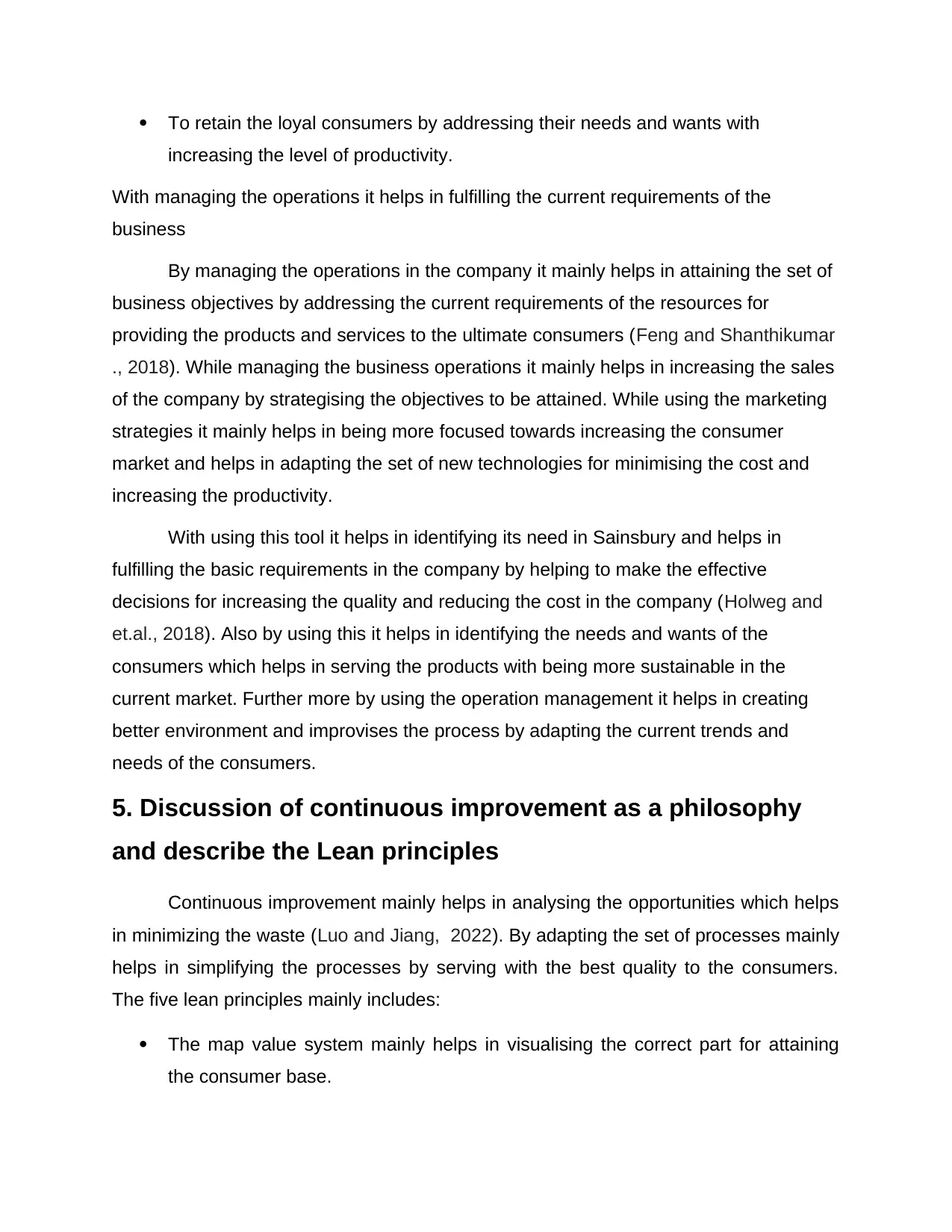
To retain the loyal consumers by addressing their needs and wants with
increasing the level of productivity.
With managing the operations it helps in fulfilling the current requirements of the
business
By managing the operations in the company it mainly helps in attaining the set of
business objectives by addressing the current requirements of the resources for
providing the products and services to the ultimate consumers (Feng and Shanthikumar
., 2018). While managing the business operations it mainly helps in increasing the sales
of the company by strategising the objectives to be attained. While using the marketing
strategies it mainly helps in being more focused towards increasing the consumer
market and helps in adapting the set of new technologies for minimising the cost and
increasing the productivity.
With using this tool it helps in identifying its need in Sainsbury and helps in
fulfilling the basic requirements in the company by helping to make the effective
decisions for increasing the quality and reducing the cost in the company (Holweg and
et.al., 2018). Also by using this it helps in identifying the needs and wants of the
consumers which helps in serving the products with being more sustainable in the
current market. Further more by using the operation management it helps in creating
better environment and improvises the process by adapting the current trends and
needs of the consumers.
5. Discussion of continuous improvement as a philosophy
and describe the Lean principles
Continuous improvement mainly helps in analysing the opportunities which helps
in minimizing the waste (Luo and Jiang, 2022). By adapting the set of processes mainly
helps in simplifying the processes by serving with the best quality to the consumers.
The five lean principles mainly includes:
The map value system mainly helps in visualising the correct part for attaining
the consumer base.
increasing the level of productivity.
With managing the operations it helps in fulfilling the current requirements of the
business
By managing the operations in the company it mainly helps in attaining the set of
business objectives by addressing the current requirements of the resources for
providing the products and services to the ultimate consumers (Feng and Shanthikumar
., 2018). While managing the business operations it mainly helps in increasing the sales
of the company by strategising the objectives to be attained. While using the marketing
strategies it mainly helps in being more focused towards increasing the consumer
market and helps in adapting the set of new technologies for minimising the cost and
increasing the productivity.
With using this tool it helps in identifying its need in Sainsbury and helps in
fulfilling the basic requirements in the company by helping to make the effective
decisions for increasing the quality and reducing the cost in the company (Holweg and
et.al., 2018). Also by using this it helps in identifying the needs and wants of the
consumers which helps in serving the products with being more sustainable in the
current market. Further more by using the operation management it helps in creating
better environment and improvises the process by adapting the current trends and
needs of the consumers.
5. Discussion of continuous improvement as a philosophy
and describe the Lean principles
Continuous improvement mainly helps in analysing the opportunities which helps
in minimizing the waste (Luo and Jiang, 2022). By adapting the set of processes mainly
helps in simplifying the processes by serving with the best quality to the consumers.
The five lean principles mainly includes:
The map value system mainly helps in visualising the correct part for attaining
the consumer base.
Paraphrase This Document
Need a fresh take? Get an instant paraphrase of this document with our AI Paraphraser
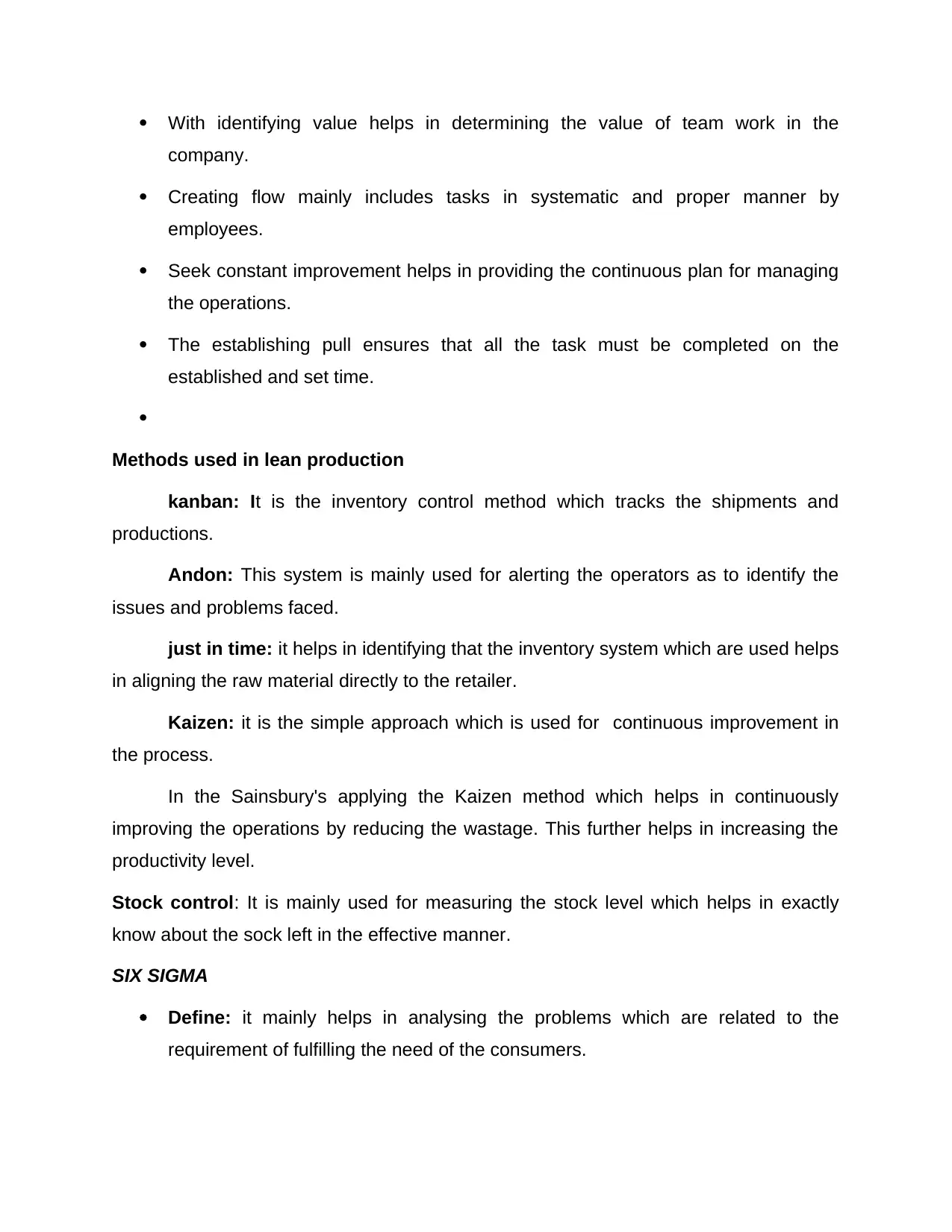
With identifying value helps in determining the value of team work in the
company.
Creating flow mainly includes tasks in systematic and proper manner by
employees.
Seek constant improvement helps in providing the continuous plan for managing
the operations.
The establishing pull ensures that all the task must be completed on the
established and set time.
Methods used in lean production
kanban: It is the inventory control method which tracks the shipments and
productions.
Andon: This system is mainly used for alerting the operators as to identify the
issues and problems faced.
just in time: it helps in identifying that the inventory system which are used helps
in aligning the raw material directly to the retailer.
Kaizen: it is the simple approach which is used for continuous improvement in
the process.
In the Sainsbury's applying the Kaizen method which helps in continuously
improving the operations by reducing the wastage. This further helps in increasing the
productivity level.
Stock control: It is mainly used for measuring the stock level which helps in exactly
know about the sock left in the effective manner.
SIX SIGMA
Define: it mainly helps in analysing the problems which are related to the
requirement of fulfilling the need of the consumers.
company.
Creating flow mainly includes tasks in systematic and proper manner by
employees.
Seek constant improvement helps in providing the continuous plan for managing
the operations.
The establishing pull ensures that all the task must be completed on the
established and set time.
Methods used in lean production
kanban: It is the inventory control method which tracks the shipments and
productions.
Andon: This system is mainly used for alerting the operators as to identify the
issues and problems faced.
just in time: it helps in identifying that the inventory system which are used helps
in aligning the raw material directly to the retailer.
Kaizen: it is the simple approach which is used for continuous improvement in
the process.
In the Sainsbury's applying the Kaizen method which helps in continuously
improving the operations by reducing the wastage. This further helps in increasing the
productivity level.
Stock control: It is mainly used for measuring the stock level which helps in exactly
know about the sock left in the effective manner.
SIX SIGMA
Define: it mainly helps in analysing the problems which are related to the
requirement of fulfilling the need of the consumers.
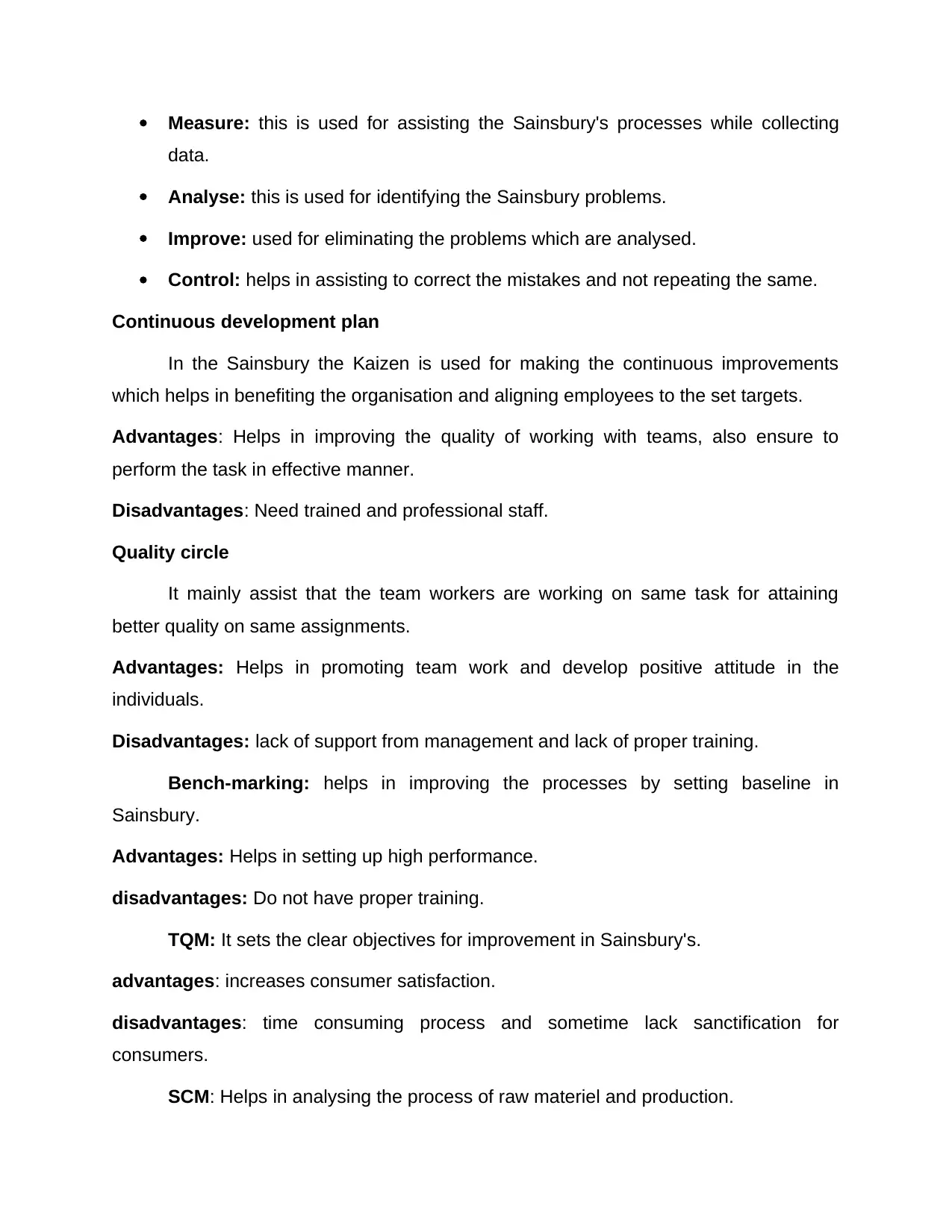
Measure: this is used for assisting the Sainsbury's processes while collecting
data.
Analyse: this is used for identifying the Sainsbury problems.
Improve: used for eliminating the problems which are analysed.
Control: helps in assisting to correct the mistakes and not repeating the same.
Continuous development plan
In the Sainsbury the Kaizen is used for making the continuous improvements
which helps in benefiting the organisation and aligning employees to the set targets.
Advantages: Helps in improving the quality of working with teams, also ensure to
perform the task in effective manner.
Disadvantages: Need trained and professional staff.
Quality circle
It mainly assist that the team workers are working on same task for attaining
better quality on same assignments.
Advantages: Helps in promoting team work and develop positive attitude in the
individuals.
Disadvantages: lack of support from management and lack of proper training.
Bench-marking: helps in improving the processes by setting baseline in
Sainsbury.
Advantages: Helps in setting up high performance.
disadvantages: Do not have proper training.
TQM: It sets the clear objectives for improvement in Sainsbury's.
advantages: increases consumer satisfaction.
disadvantages: time consuming process and sometime lack sanctification for
consumers.
SCM: Helps in analysing the process of raw materiel and production.
data.
Analyse: this is used for identifying the Sainsbury problems.
Improve: used for eliminating the problems which are analysed.
Control: helps in assisting to correct the mistakes and not repeating the same.
Continuous development plan
In the Sainsbury the Kaizen is used for making the continuous improvements
which helps in benefiting the organisation and aligning employees to the set targets.
Advantages: Helps in improving the quality of working with teams, also ensure to
perform the task in effective manner.
Disadvantages: Need trained and professional staff.
Quality circle
It mainly assist that the team workers are working on same task for attaining
better quality on same assignments.
Advantages: Helps in promoting team work and develop positive attitude in the
individuals.
Disadvantages: lack of support from management and lack of proper training.
Bench-marking: helps in improving the processes by setting baseline in
Sainsbury.
Advantages: Helps in setting up high performance.
disadvantages: Do not have proper training.
TQM: It sets the clear objectives for improvement in Sainsbury's.
advantages: increases consumer satisfaction.
disadvantages: time consuming process and sometime lack sanctification for
consumers.
SCM: Helps in analysing the process of raw materiel and production.
⊘ This is a preview!⊘
Do you want full access?
Subscribe today to unlock all pages.

Trusted by 1+ million students worldwide
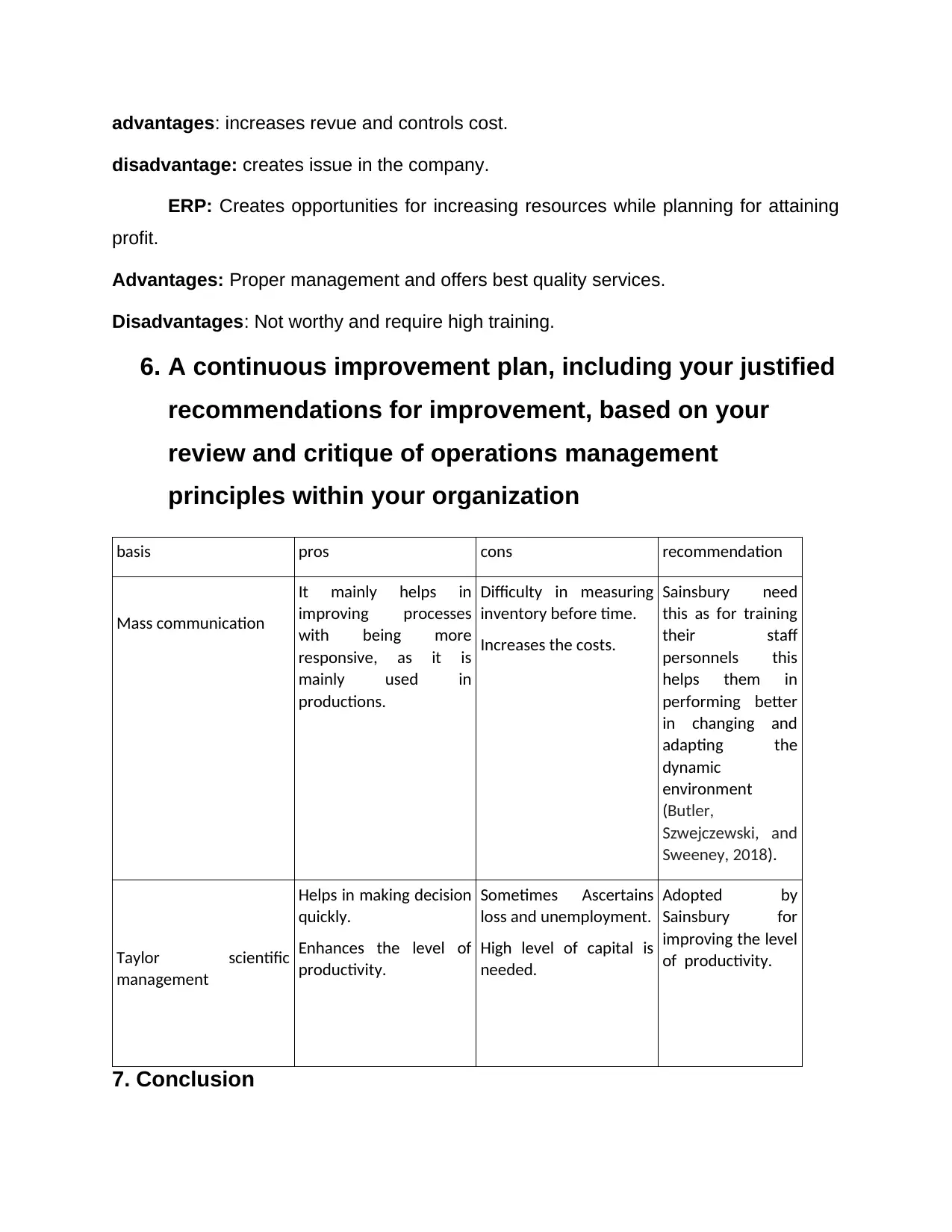
advantages: increases revue and controls cost.
disadvantage: creates issue in the company.
ERP: Creates opportunities for increasing resources while planning for attaining
profit.
Advantages: Proper management and offers best quality services.
Disadvantages: Not worthy and require high training.
6. A continuous improvement plan, including your justified
recommendations for improvement, based on your
review and critique of operations management
principles within your organization
basis pros cons recommendation
Mass communication
It mainly helps in
improving processes
with being more
responsive, as it is
mainly used in
productions.
Difficulty in measuring
inventory before time.
Increases the costs.
Sainsbury need
this as for training
their staff
personnels this
helps them in
performing better
in changing and
adapting the
dynamic
environment
(Butler,
Szwejczewski, and
Sweeney, 2018).
Taylor scientific
management
Helps in making decision
quickly.
Enhances the level of
productivity.
Sometimes Ascertains
loss and unemployment.
High level of capital is
needed.
Adopted by
Sainsbury for
improving the level
of productivity.
7. Conclusion
disadvantage: creates issue in the company.
ERP: Creates opportunities for increasing resources while planning for attaining
profit.
Advantages: Proper management and offers best quality services.
Disadvantages: Not worthy and require high training.
6. A continuous improvement plan, including your justified
recommendations for improvement, based on your
review and critique of operations management
principles within your organization
basis pros cons recommendation
Mass communication
It mainly helps in
improving processes
with being more
responsive, as it is
mainly used in
productions.
Difficulty in measuring
inventory before time.
Increases the costs.
Sainsbury need
this as for training
their staff
personnels this
helps them in
performing better
in changing and
adapting the
dynamic
environment
(Butler,
Szwejczewski, and
Sweeney, 2018).
Taylor scientific
management
Helps in making decision
quickly.
Enhances the level of
productivity.
Sometimes Ascertains
loss and unemployment.
High level of capital is
needed.
Adopted by
Sainsbury for
improving the level
of productivity.
7. Conclusion
Paraphrase This Document
Need a fresh take? Get an instant paraphrase of this document with our AI Paraphraser
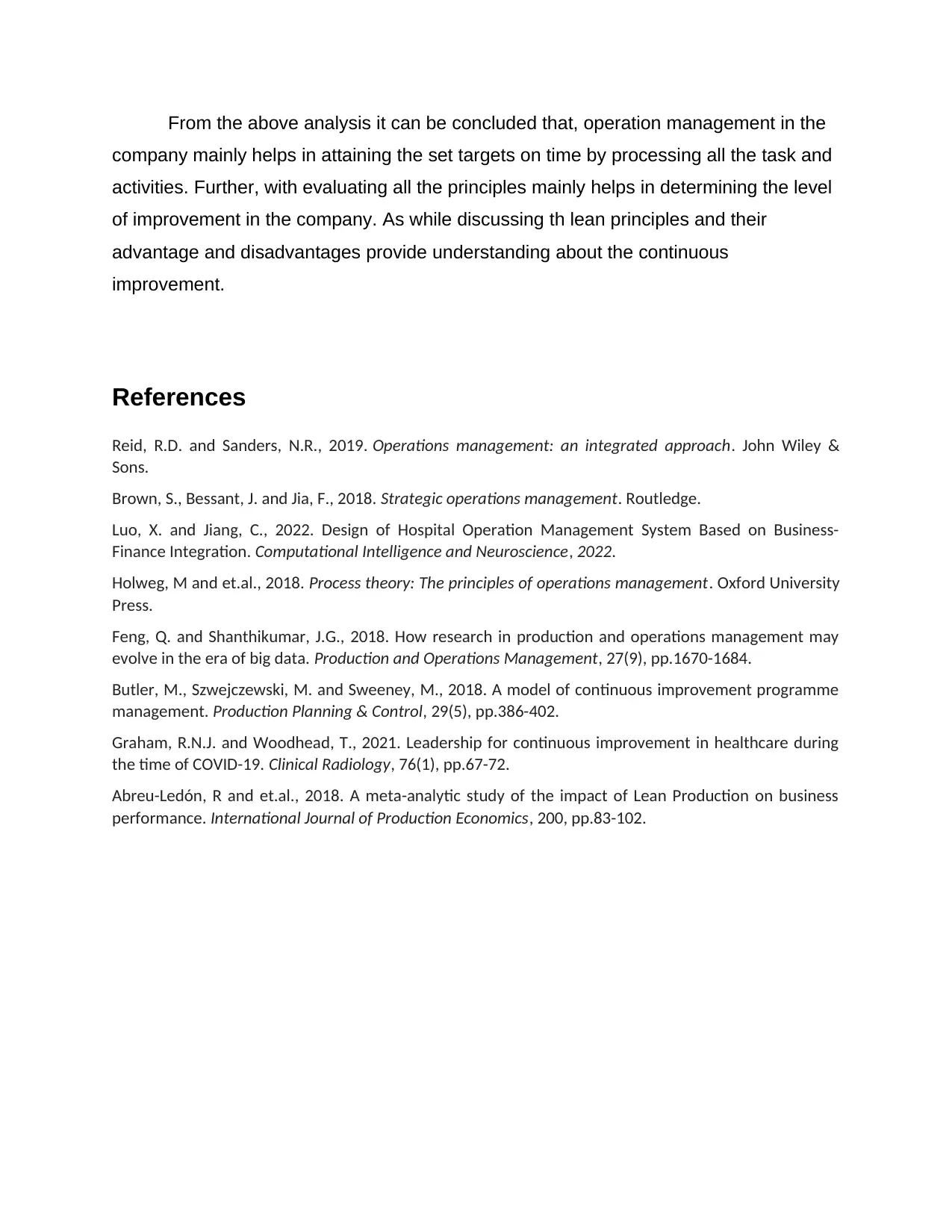
From the above analysis it can be concluded that, operation management in the
company mainly helps in attaining the set targets on time by processing all the task and
activities. Further, with evaluating all the principles mainly helps in determining the level
of improvement in the company. As while discussing th lean principles and their
advantage and disadvantages provide understanding about the continuous
improvement.
References
Reid, R.D. and Sanders, N.R., 2019. Operations management: an integrated approach. John Wiley &
Sons.
Brown, S., Bessant, J. and Jia, F., 2018. Strategic operations management. Routledge.
Luo, X. and Jiang, C., 2022. Design of Hospital Operation Management System Based on Business-
Finance Integration. Computational Intelligence and Neuroscience, 2022.
Holweg, M and et.al., 2018. Process theory: The principles of operations management. Oxford University
Press.
Feng, Q. and Shanthikumar, J.G., 2018. How research in production and operations management may
evolve in the era of big data. Production and Operations Management, 27(9), pp.1670-1684.
Butler, M., Szwejczewski, M. and Sweeney, M., 2018. A model of continuous improvement programme
management. Production Planning & Control, 29(5), pp.386-402.
Graham, R.N.J. and Woodhead, T., 2021. Leadership for continuous improvement in healthcare during
the time of COVID-19. Clinical Radiology, 76(1), pp.67-72.
Abreu-Ledón, R and et.al., 2018. A meta-analytic study of the impact of Lean Production on business
performance. International Journal of Production Economics, 200, pp.83-102.
company mainly helps in attaining the set targets on time by processing all the task and
activities. Further, with evaluating all the principles mainly helps in determining the level
of improvement in the company. As while discussing th lean principles and their
advantage and disadvantages provide understanding about the continuous
improvement.
References
Reid, R.D. and Sanders, N.R., 2019. Operations management: an integrated approach. John Wiley &
Sons.
Brown, S., Bessant, J. and Jia, F., 2018. Strategic operations management. Routledge.
Luo, X. and Jiang, C., 2022. Design of Hospital Operation Management System Based on Business-
Finance Integration. Computational Intelligence and Neuroscience, 2022.
Holweg, M and et.al., 2018. Process theory: The principles of operations management. Oxford University
Press.
Feng, Q. and Shanthikumar, J.G., 2018. How research in production and operations management may
evolve in the era of big data. Production and Operations Management, 27(9), pp.1670-1684.
Butler, M., Szwejczewski, M. and Sweeney, M., 2018. A model of continuous improvement programme
management. Production Planning & Control, 29(5), pp.386-402.
Graham, R.N.J. and Woodhead, T., 2021. Leadership for continuous improvement in healthcare during
the time of COVID-19. Clinical Radiology, 76(1), pp.67-72.
Abreu-Ledón, R and et.al., 2018. A meta-analytic study of the impact of Lean Production on business
performance. International Journal of Production Economics, 200, pp.83-102.
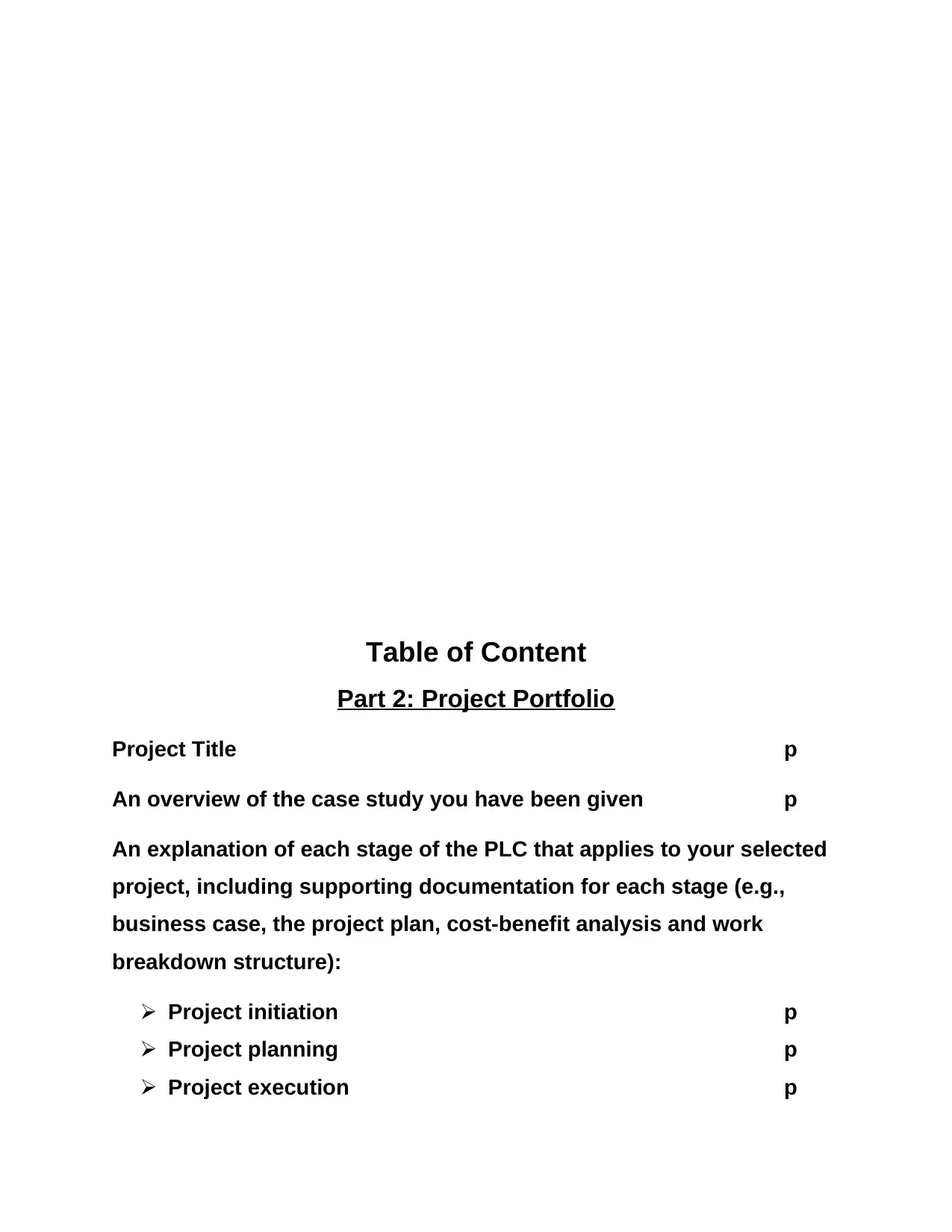
Table of Content
Part 2: Project Portfolio
Project Title p
An overview of the case study you have been given p
An explanation of each stage of the PLC that applies to your selected
project, including supporting documentation for each stage (e.g.,
business case, the project plan, cost-benefit analysis and work
breakdown structure):
Project initiation p
Project planning p
Project execution p
Part 2: Project Portfolio
Project Title p
An overview of the case study you have been given p
An explanation of each stage of the PLC that applies to your selected
project, including supporting documentation for each stage (e.g.,
business case, the project plan, cost-benefit analysis and work
breakdown structure):
Project initiation p
Project planning p
Project execution p
⊘ This is a preview!⊘
Do you want full access?
Subscribe today to unlock all pages.

Trusted by 1+ million students worldwide
1 out of 24
Related Documents
Your All-in-One AI-Powered Toolkit for Academic Success.
+13062052269
info@desklib.com
Available 24*7 on WhatsApp / Email
![[object Object]](/_next/static/media/star-bottom.7253800d.svg)
Unlock your academic potential
Copyright © 2020–2026 A2Z Services. All Rights Reserved. Developed and managed by ZUCOL.

